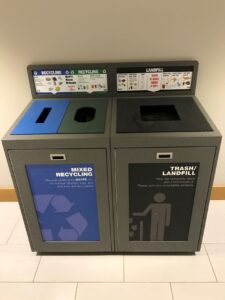Want the latest about recycling on campus?
Contact Phil Piedmont at ppiedmon@facilities.rochester.edu or (585) 690-9119.
Discover how we can divert waste from landfills through our various campus recycling programs.
 Recycling contamination occurs when non-recyclable materials, like Styrofoam or plastic cups, are put in the recycle bin. Recyclable items that are not empty and clean of food and liquid waste also create contamination. The contents of recycle bins that are too contaminated have to be put in the trash.
Recycling contamination occurs when non-recyclable materials, like Styrofoam or plastic cups, are put in the recycle bin. Recyclable items that are not empty and clean of food and liquid waste also create contamination. The contents of recycle bins that are too contaminated have to be put in the trash.
Another way to contaminate recycling is by wishcycling. Wishcycling means putting items into the recycle bin when you are not sure if they’re actually recyclable. While wishcyclers have good intentions—they hope and wish the item can be recycled—they can often contribute to the recycling contamination problem.
Remember: When in doubt, throw it out.
Reference the drop-downs below to understand what specifically is recyclable. You can also review Monroe County’s recycling webpage for helpful infographics, brochures, images, and FAQs about recyclable materials.
Acceptable clean metal items include:
Acceptable clean glass:
No drinking glasses, window glass, Pyrex, light bulbs, etc.
You can recycle most clean paper products, including:
*Window envelopes: Help the Medical Center reduce paper! Every week, Clinical Laboratories sends out hundreds of white windowed envelopes containing lab results. Although the envelopes can be recycled along with many other varieties of paper, they are also perfect for reuse since nothing is typed or written on them. Return envelopes to: Clinical Laboratories, Attn: Steven Bowers, Box 278846.
Inkjet, laser, and toner cartridges as well as drums and fusers can be recycled by mail or by drop off to several areas around the University. Rebates from this recycling program support the planting of new trees on campus!
Package the recyclables in any box or envelope and mail to University Mail Services, PO Box 270001.
River Campus
Medical Center
The University recycles rechargeable batteries (not alkaline) in accordance with Monroe County Environmental Services and NYSDEC guidelines. All alkaline batteries can be disposed of in the regular trash. Contact the University’s Environmental Compliance Unit at (585) 275-2056 if your area is interested in arranging a battery collection location.
Batteries can be dropped off at the following locations:
River Campus
Medical Center
University IT Equipment Recovery has information about pick-up/drop-off options and what’s eligible for recycling.
The Sustainability Office hosts an annual E-Cycle Day each fall for members of the University community to recycle personal electronics.
Contact the Facilities Customer Service Center at (585) 273-4567 to schedule a service request for University document shredding.
The Sustainability Office hosts the annual Shred Fest in the summer for safe and secure destruction and recycling of personal paper documents.
The University of Rochester’s shoe reuse and recycling program has been redesigned to bring usable shoes first and foremost to those in need.
Donation bins can be found in the main locker rooms of the Goergen Athletic Center. All types of shoes are accepted.
Each batch of collected shoes is provided to Hope Dealers, a nonprofit providing services to those who are economically disadvantaged and/or unhoused in the local Rochester community. Once Hope Dealers receives what they need, the remaining shoes are donated to St. Pauly Textile, a Western NY-based organization who will distribute the remaining reusable shoes to those in need and send those unsuitable for reuse to recycling.
From April 2009 to July 2024, the University participated in Nike’s Reuse-A-Shoe program. Through this program, 5,416 pairs of sneakers, equating to nearly six tons, were collected and recycled.
Plastic bags should never be placed in a regular recycling bin. Instead, they must be collected through a specialized collection program. Acceptable bags include:
Plastic bags can be dropped off in the special kiosk in Wilson Common’s Hirst Lounge.
Contact the University’s Environmental Compliance Unit at (585) 275-2056 to:
Bring empty pipette tip boxes to the Biological Supply Center at:
601 Elmwood Avenue Box 637 Room G8633
The Supply Center is open on weekdays from 8:00 AM to 4:00 PM, except from noon to 1:00 PM. For questions, please contact Michael Hughson at michael_hughson@urmc.rochester.edu.
Want the latest about recycling on campus?
Contact Phil Piedmont at ppiedmon@facilities.rochester.edu or (585) 690-9119.